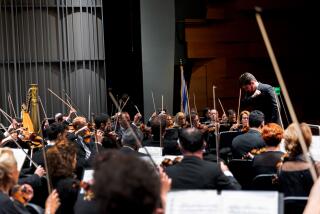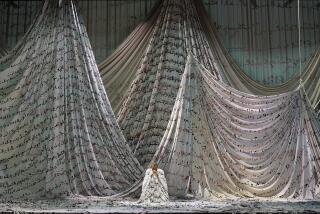Saluting Unsung Heroes in ‘Seven Passages’ Debut
- Share via
Are heroes born or made? The latter, says composer Behzad Ranjbaran in his new “Seven Passages.”
The 14-minute work was commissioned by the Long Beach Symphony, which gave the world premiere on a three-part program led by JoAnn Falletta on Saturday at the Terrace Theater.
The music, in one continuous, episodic movement, is based on an 11th century epic by Persian poet Ferdowsi. It vividly depicts the trials of the poem’s hero in fighting and defeating everything from wild beasts to witches, demons and dragons.
Unlike a piece such as Strauss’ tone poem “Till Eulenspiegels lustige Streiche,” however, the episodes are not spelled out specifically, at least not in the program booklet, which leaves much to the imagination. Perhaps someone familiar with the poem can follow the sequences more accurately without outside help.
But a more important difference from Strauss’ work is that the heroic theme emerges in the course of the music. It doesn’t arrive fully formed, although it is adumbrated and appears in fragments as the work progresses from a fairy-tale gossamer beginning to its full-scale triumphant conclusion.
This allows the composer to underscore his general point--which is spelled out in the program booklet: “I have come to realize that in real life, courageous acts are not limited only to heroes. Unsung heroes perform countless acts of courage and struggle daily.”
It is in the course of experience, in other words, that character is shaped and tested and emerges.
The theme of the concert continued with the Suite No. 2 from Roussel’s ballet “Bacchus et Ariane.” Under Falletta’s sensitive leadership, the orchestra played with great delicacy and transparency, yet also joyfully expressed the Greek Dionysian mania as filtered through Roussel’s French sensibility.
After intermission, John Browning joined Falletta and the orchestra as soloist in Tchaikovsky’s Piano Concerto No. 1. Browning took a lyrical and mellow approach to this warhorse, muting its fire and bravura. This worked best in the slow movement but led to deficiencies, especially of rhythmic snap, elsewhere.
Falletta took his cue and responded with diffuse, four-square accompaniment, dampening the composer’s emotional turbulence and exaltation.
More to Read
The biggest entertainment stories
Get our big stories about Hollywood, film, television, music, arts, culture and more right in your inbox as soon as they publish.
You may occasionally receive promotional content from the Los Angeles Times.










